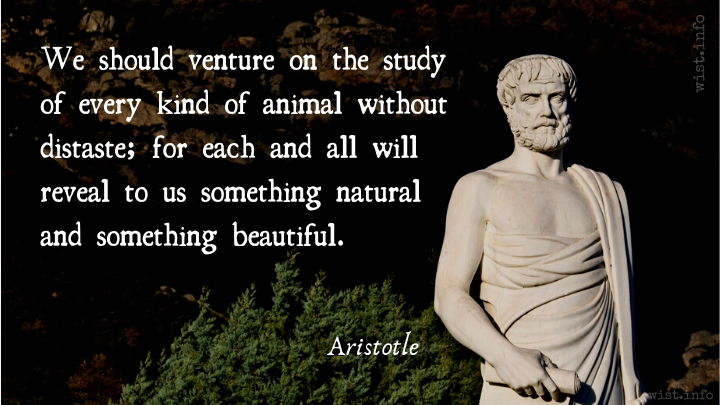We therefore must not recoil with childish aversion from the examination of the humbler animals. Every realm of nature is marvelous: and as Heraclitus, when the strangers who came to visit him found him warming himself at the furnace in the kitchen and hesitated to go in, reported to have bidden them not to be afraid to enter, as even in that kitchen divinities were present, so we should venture on the study of every kind of animal without distaste; for each and all will reveal to us something natural and something beautiful.
Aristotle (384-322 BC) Greek philosopher
Parts of Animals [De Partibus Animalium], Book 1, part 5 (645a.15) (c. 350 BC) [tr. Ogle (1912)]
(Source)
Alternate translation:For this reason we should not be childishly disgusted at the examination of the less valuable animals. For in all natural things there is something marvelous. Even as Heraclitus is said to have spoken to those strangers who wished to meet him but stopped as they were approaching when they saw him warming himself by the oven -- he bade them enter without fear, "for there are gods here too" -- so too one should approach research about each of the animals without disgust, since in every one there is something natural and good.
[tr. Lennox (2001)]
Quotations about:
marvel
Note not all quotations have been tagged, so Search may find additional quotes on this topic.
The invariable mark of wisdom is to see the miraculous in the common.
Ralph Waldo Emerson (1803-1882) American essayist, lecturer, poet
“Nature,” ch. 8, Nature: Addresses and Lectures (1849)
(Source)
MIRANDA: O, wonder!
How many goodly creatures are there here!
How beauteous mankind is! O brave new world,
That has such people in’t!William Shakespeare (1564-1616) English dramatist and poet
Tempest, Act 5, sc. 1, l. 250ff (5.1.250-253) (1611)
(Source)
Men go forth to marvel at the heights of mountains and the huge waves of the sea, the broad flow of the rivers, the vastness of the ocean, the orbits of the stars, and yet they neglect to marvel at themselves.
[Et eunt homines mirari alta montium et ingentes fluctus maris et latissimos lapsus fluminum et oceani ambitum et gyros siderum, et relinquunt se ipsos.]
Augustine of Hippo (354-430) Christian church father, philosopher, saint [b. Aurelius Augustinus]
Confessions, Book 10, ch. 8 / ¶ 15 (10.8.15) (c. AD 398) [tr. Outler (1955)]
(Source)
(Source (Latin)). Alternate translations:And men go abroad to admire the heights of mountains, the mighty billows of the sea, the broad tides of rivers, the compass of the ocean, and the circuits of the stars, and pass themselves by.
[tr. Pusey (1838)]And men go forth to wonder at the heights of mountains, the huge waves of the sea, the broad flow of the rivers, the extent of the ocean, and the courses of the stars, and omit to wonder at themselves.
[tr. Pilkington (1876)]And men travel to admire the heights of mountains, and the vast waves of the sea, and the broad streams of rivers, and the circuit of the ocean, and the orbits of stars, and pass over themselves.
[tr. Hutchings (1890)]Here are men going afar to marvel at the heights of mountains, the mighty waves of the sea, the long courses of great rivers, the vastness of the ocean, the movements of the stars, yet leaving themselves unnoticed.
[tr. Sheed (1943)]Men go forth to marvel at the mountain heights, at huge waves in the sea, at the broad expanse of flowing rivers, at the wide reaches of the ocean, and at the circuits of the stars, but themselves they pass by.
[tr. Ryan (1960)]Yet men go out and gaze in astonishment at high mountains, the huge waves of the sea, the broad reaches of rivers, the ocean that encircles the world, or the stars in their courses. But they pay no attention to themselves.
[tr. Pine-Coffin (1961)]And men go abroad to wonder at the heights of mountains, the huge waves of the sea, the broad streams of rivers, the vastness of the ocean, the turnings of the stars -- and they do not notice themselves.
[tr. Warner (1963)]Men go to wonder at the heights of mountains, and the huge billows of the sea, the broad sweeps of the rivers, the curve of ocean and the circuits of the stars, and yet pass by themselves.
[tr. Blaiklock (1983)]






